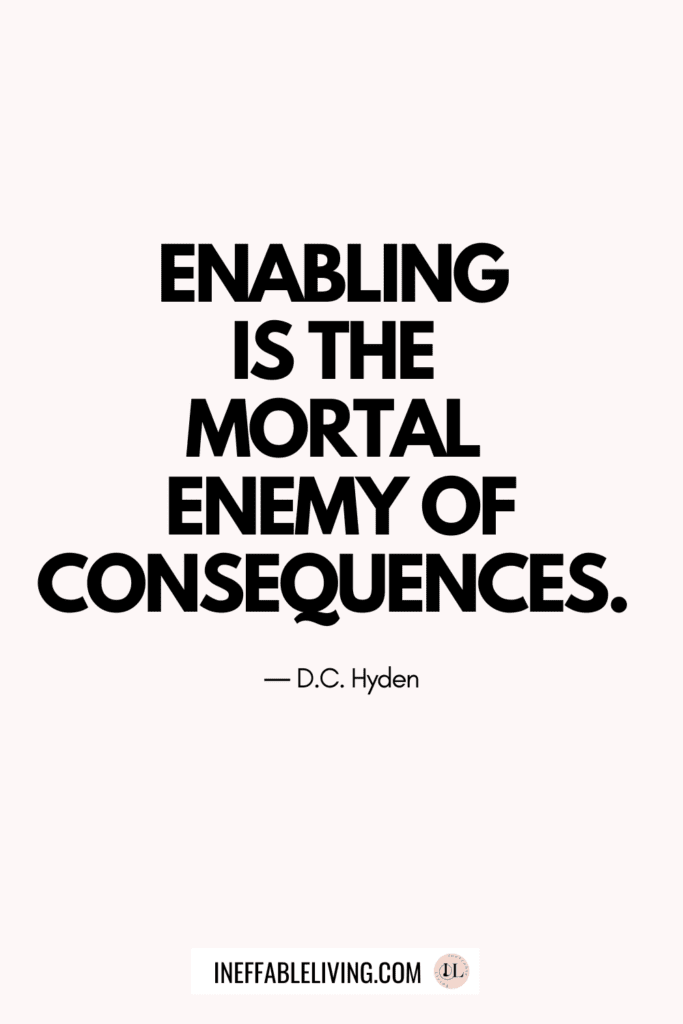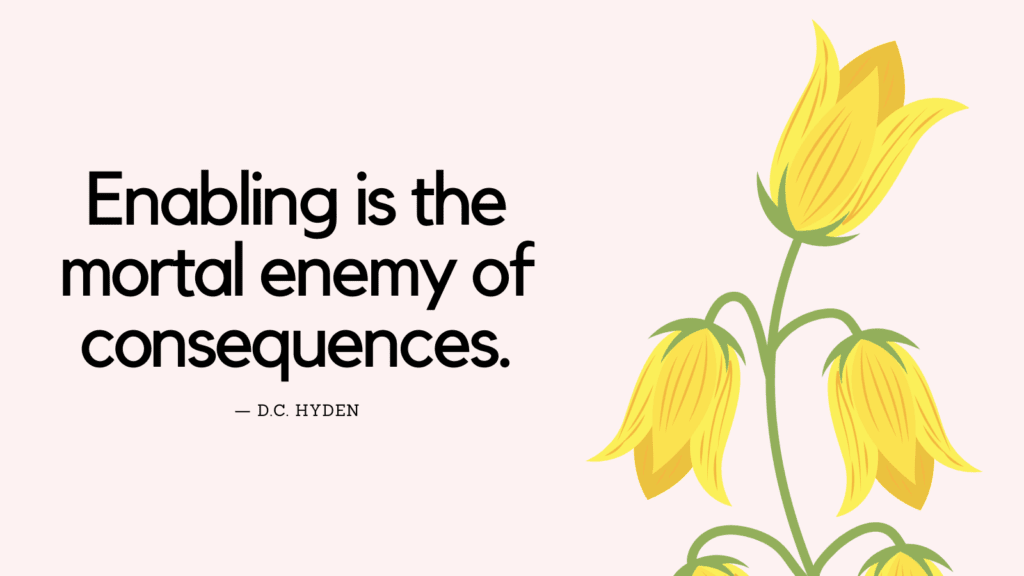This post contains some of the best enabling quotes.
What Is Enabling?
Enabling is the act of justifying, covering, or indirectly supporting someone else’s unhealthy behavior (e.g. alcohol or substance addiction, unlawful actions, self-harm, etc.).
Enabling behaviors can be common in codependent relationships.
Enabling behavior isn’t about intent. Enabling doesn’t mean you support the other person’s harmful behavior.
You might believe that you are helping.
But this help is ultimately not helpful. It often makes things worse since the enabled person has less motivation to make changes as long as they never have to face the consequences of their actions.
Enabling Quotes
1. “The enabler will love the addict into darkness. The addict becomes a shadow of the person they once were. The enabler love is blind and selfish. Blind, because they cannot see the selfishness, when they cradle their own emotions over the addict’s recovery. It will always be tough love, support and lots of praying to keep an addict clean. The underlined reason for the substance abuse can only be found when the addict is thinking clearly.” ― Ron Baratono
2. “If you want someone to be for you, never let him feel he is dependent upon you; rather, in some way, make him feel that you are dependent upon him.” ― George C. Marshal
3. “Enabling is the mortal enemy of consequences.” ― D.C. Hyden
4. “As you might imagine, helping people by repeatedly bailing them out of trouble they brought on themselves can enable their imma-turity and irresponsibility. It prevents them from learning the important lessons and skills that promote high functioning.” – Shawn Meghan Burn
5. “My point is only that enabling is a poor use of our helpful and supportive energies because it makes it easier for others to make unhealthy choices.” – Shawn Meghan Burn
6. “Doing other people’s tasks isn’t necessarily enabling them. In healthy relationships we do things to make the other person’s life easier or pleasant and they do the same for us—even though these are things we can both, do for ourselves. This reciprocal caring promotes relationship health since it meets partners’ need to be cared for.” – Shawn Meghan Burn
7. “We all occasionally make mistakes and need support and assistance. But that’s different from enabling someone’s underperformance by repeatedly accepting their questionable explanations. One way to think of it is that when it’s a pattern, it’s a problem.” – Shawn Meghan Burn
Related: Caregiving vs Caretaking (The Savior Complex)
8. “Once you enable another by protecting them from the natural consequences of their actions, you can expect more of the undesired behavior, necessitating more covering, and creating a self-perpetuating dysfunctional helping cycle.” – Shawn Meghan Burn
9. “The most extreme codependent relationships involve a close relationship revolving around one person’s poor functioning and another’s enabling and rescuing. These are relationships built on one person’s being a giver and the other an under-functioning taker.” – Shawn Meghan Burn
10. “There’s probably no relationship with greater enabling and codependent relationship potential than the parent-child relationship. Trying to support their children, parents sometimes enable their children’s dependence, irresponsibility, or poor health.” – Shawn Meghan Burn
11. “Parents’ enabling of their children often stems from guilt over their past parenting mistakes. Fears of abandonment can also motivate parents’ dysfunctional helping and giving. Some parents fear that without their children’s dependence, they’ll have little or no relation-ship with them.” – Shawn Meghan Burn

12. “Not enabling your children is also more sustainable because it’s less likely to deplete your limited emotional, physical, and financial resources. You can also go to your grave knowing that they can take care of themselves.” – Shawn Meghan Burn
Related: Codependency Quiz (+FREE Codependency Worksheets PDF)
13. “An adult child’s enabling of a parent is most likely when a parent is emotionally immature, has a personality disorder (such as borderline personality disorder or anti-social personality disorder), or suffers from some other untreated psychiatric disorder or addiction. Sometimes such parents plant and nurture the seeds of a codependent relationship by parentijying the child from an early age.” – Shawn Meghan Burn
14. “Admittedly, it can be challenging to determine whether our help is risk-reduction or enabling.” – Shawn Meghan Burn
15. “The enabling chain consists of multiple, linked enabling relationships involving at least three people: the taker, the primary unhealthy giver, and an accessory giver. The accessory giver is a loyal friend, relative, or partner that aids and abets the primary giver’s enabling of the taker (essentially enabling the enabler).” – Shawn Meghan Burn
16. “Sometimes the taker breaks the chain. For example, they may break the enabling link between themselves and their primary giver by getting sober. They also may grow more mature and accept their adult responsibilities, or become embarrassed by their dependence and motivated to achieve self-sufficiency.” – Shawn Meghan Burn
Related: Best 50 Codependency Affirmations For Recovering Codependents
17. “Most people find themselves entrapped in an uncomfortable helping or giving situation at some point in their lives. They make what they intend to be a one-time or short-term modest offer of help or giving only to find themselves in an unintended long-term obligation that’s hard to get out of. I call this helping and giving entrapment.” – Shawn Meghan Burn
18. “Accommodating behaviors also enable when they sand down the rough edges of another’s suffering just enough that they can live with the now-modulated effects of their problem. And that reduces their motivation to seek a more independent, sustainable solution.” – Shawn Meghan Burn
19. “Altering our suspected enabling behaviors is usually worth a try because it sometimes benefits the other’s maturity or health. We also benefit since we regain energetic and material resources. We also regain hope. But admittedly, changing our helping and giving won’t always produce the results we want. We can offer help that supports healthy change but that doesn’t mean they’ll take us up on it.” – Shawn Meghan Burn
20. “In these extreme cases, you might provide help that reduces the life-threatening harms caused by their unhealthy behaviors so there’s hope for their survival and future recovery. This risk-reduction or harm-reduction isn’t the same thing as enabling.” – Shawn Meghan Burn
21. “Question whether your help will enable another’s immaturity, addiction, or irresponsibility. Help or give only if it’s really the best thing to do.” – Shawn Meghan Burn

How To Stop Enabling Behavior?
Enabling behavior can be difficult to recognize and break, but it is possible with the right approach.
Here are some steps you can take to stop enabling behaviors:
1. Identify enabling behaviors: Make a list of the behaviors that enable the person you are trying to help. This could include fixing their problems, making excuses for them, or not holding them accountable for their actions.
2. Set boundaries: Decide what you are willing to do and not do for the person you are enabling. Be clear and consistent in communicating these boundaries to them.
3. Stop rescuing: Refrain from stepping in to fix their problems for them. Allow them to experience the natural consequences of their actions.
4. Encourage independence: Instead of doing things for them, encourage them to do things for themselves. This will help them become more self-sufficient.
5. Practice self-care: Take care of yourself by setting aside time for activities that you enjoy and find relaxing. This will help you feel more confident in your ability to stand up to the person you are trying to help.
Remember, breaking enabling behavior is a process that takes time.
Stick to your boundaries and stay consistent in your approach.
With patience and persistence, you can create healthier relationships and empower those around you to take responsibility for their own lives.
References
- Portions of this article were adapted from the book Unhealthy Helping, © 2016 by Shawn Meghan Burn. All rights reserved.



